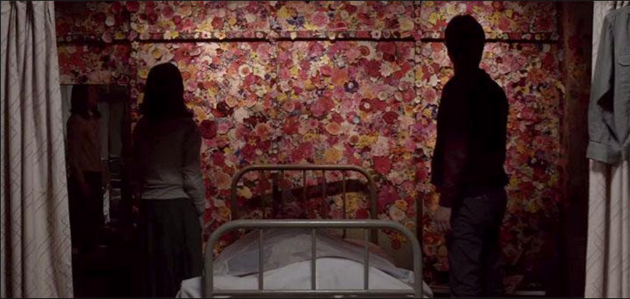
There is no shortage of similarities in Kiyoshi Kurosawa's new film Journey to the Shore with Kore-eda's 1995 quiet masterpiece, Maborosi. Both films deal with the loss, grief, impermanence of life and letting go. Both films star Tadanobu Asano as the husband who passed on. It is good to note that the books the two films are based on came out around the same time in the 1990s too. It might be my age but I've been thinking about the subject myself a lot lately. Once the thought of death hits you, from then on, you just live under the shadow of its inevitability. Sometimes it keeps me up at night. I don't know how people who are innately more precocious and neurotic than me deal with the fact. Anyway, back to the film:
Mizuki (Eri Fukatsu), a piano teacher and a wife whose husband has been presumed dead in the sea, leads a quiet existence in Tokyo. One day, her dead husband, Yusuke (Asano) appears in her living room, wearing shoes (Japanese take off their shoes indoors usually). He says it was a long journey to come back. His corpse was eaten by the crabs, so that's why there was no trace of him left, he says it matter of factly. She is delighted but also afraid that she will lose him again. Always on her toes, hoping that his semi-permanent reappearance is not just recurring dreams. He suggests they leave town, so he can show her many beautiful places he'd passed through during his home journey.
So begins Mizuki's journey to letting go: Yusuke left great impressions on many people he encountered the last three years in the Japanese countryside. Some of them are already dead like Yusuke - he says, again, very matter of factly, "He's like me," meaning the dead, or "She's like you, the living," and so on. So what does Mizuki learn? That human life is complicated? that nobody know anybody, not that well? That you still make differences in other people's lives even though you are dead? That you can have sex with a ghost? With somewhat conventional TV orchestral music, Kurosawa seems to be well aware of the film's Lifetime channel-like melodramatic nature. But as he demonstrated in Tokyo Sonata, he has a great eye for indoor spaces and framing, shadows and light and playing with supernatural/surreal elements that he has cultivated over many years in genre filmmaking. In this subtle, muted gentle chamber piece, he shows that yearning, grieving and fear of letting go are only a few degrees off from horror of loneliness in his genre films. Journey is not as lyrical nor as poetic as Maborosi, nor has a succinct narrative. But the film features many beautiful moments and fine tuned performances by two leads to make it quite memorable.